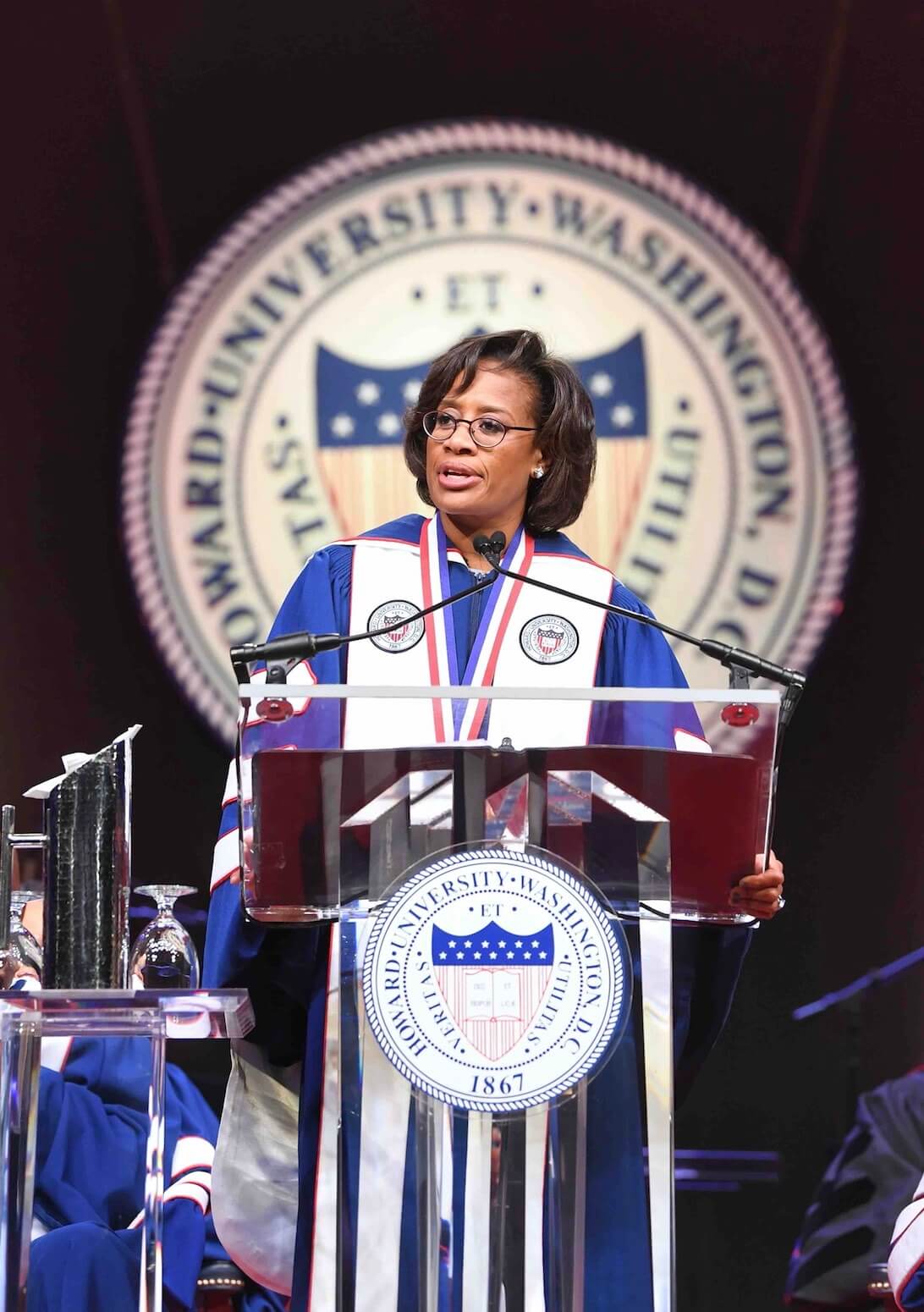 WASHINGTON – Trustee and Alumna Leslie D. Hale lauded Howard University at the 153rd Charter Day Convocation, saying the United States would not be the nation it is today without Howard's founding. Each year, the ceremony commemorates the 1867 federal charter establishing Howard as a university.
WASHINGTON – Trustee and Alumna Leslie D. Hale lauded Howard University at the 153rd Charter Day Convocation, saying the United States would not be the nation it is today without Howard's founding. Each year, the ceremony commemorates the 1867 federal charter establishing Howard as a university.
In her convocation address, Hale said Howard's founding changed the course of American history, and its charter deserves to be celebrated alongside other great historical documents.
“In hindsight we can clearly see that the university the charter gave birth to seismically shifted the way Black Americans contribute to and function in American society,” Hale said. “None of this was prophesized or predestined in the charter. It was the generations of Black thinkers who came to this university who established this legacy.”
Hale is the president and chief executive officer of RLJ Lodging Trust, a leading hotel real estate investment trust. She is the only African American female CEO of a publicly traded real estate investment trust. Since joining the organization in 2005, she has played a pivotal role in setting and executing the strategic vision at the firm and has held progressively senior-level roles during her tenure.
Hale was appointed in 2007 to serve as chief financial officer, in 2016 she was elevated to chief operating officer and in 2018 she was named president and chief executive officer. She helped lead the successful initial public offering of RLJ Lodging Trust in 2011 and is a member of RLJ Lodging Trust’s board of directors.
Trustee Hale earned a Bachelor of Business Administration degree with a concentration in finance from Howard University in 1994, graduating summa cum laude (Beta Gamma Sigma Honor Society) and earned an MBA from Harvard Business School, where she was a Goldman Sachs and Robert F. Toigo Fellow.
Hale said her undergraduate education at Howard nurtured a love of finance and for numbers.
“I fell in love with taking one dollar and making it into two,” she said.
Hale described her first deep connection to Howard occurring instantly when her parents took her on a Black college tour. It featured Howard as the last stop.
“The sun was shining and the trees were in full bloom,” Hale said. “You could feel the legacy in the air. I had an overwhelming feeling that this is where I was supposed to be, that I belonged here.”
At the convocation ceremony, Howard University President Wayne A. I. Frederick called Howard University a landmark in the nation’s capital “standing for truth and right” and a meeting place for truth, excellence, and service – pillars of the University’s motto.
“Let us not forget that at this institution, which is the case for no other institution, all races, genders, identities, and social classes have had and continue to sit together in pursuit of knowledge and justice. Howard University is the result of vision and dreams imagined.”
Stacey J. Mobley, chairman of the Board of Trustees, in his convocation remarks said Charter Day was a “monumental celebration” and a time to reconnect and celebrate accomplishments.
“It’s a time to give back to alma mater which has given us each so much,” Mobley said. “Whether you are an alumnus, a current student, a professor, an administrator or just a friend of Howard University, we all have a lot to be thankful for.”
The Charter Day Convocation sets the stage for the following evening’s highly-anticipated Charter Day Dinner. The annual black-tie gala is Howard’s premiere fundraising event.
During the event, the Alumni Award for Distinguished Postgraduate Achievement will be presented to research engineer Dereje Agonafer; sports journalist Stanley R. Verrett; and Tanya M. Walton Pratt, the first African-American federal judge in the state of Indiana’s history. The 2020 LaRue V. Barkwell Capstone Distinguished Service Award will be presented to Odessa W. Scott.
# # #
About Howard University
Founded in 1867, Howard University is a private, research university that is comprised of 13 schools and colleges. Students pursue studies in more than 120 areas leading to undergraduate, graduate and professional degrees. The University operates with a commitment to Excellence in Truth and Service and has produced one Schwarzman Scholar, three Marshall Scholars, four Rhodes Scholars, 11 Truman Scholars, 25 Pickering Fellows and more than 70 Fulbright Scholars. Howard also produces more on-campus African American Ph.D. recipients than any other university in the United States. For more information on Howard University, visit www.howard.edu.




